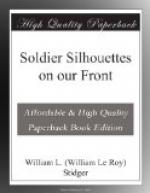One night I remember being stopped by a sentry at “Dead Man’s Curve,” because the Boche was shelling the curve that night, and we had to stop until he “laid off,” as the sentry told us. Between shells there was a great stillness on the white road that lay like a silver thread under the moonlight. The shattered stone buildings, with a great cathedral tower standing like a gaunt ghost above the ruins, were tragically beautiful under that mellow light. One almost forgot there was war under the charm of that scene until “plunk! plunk! plunk!” the big shells fell from time to time. But the thing that impressed me most that waiting hour was not the beauty of the village under the moonlight, but the fact that the lone sentry who had stopped us, and who amid the shelling stood silently, was unconsciously singing an old hymn of the church, “Rock of Ages, Cleft for Me.” I got down from my truck and walked over to where he was standing.
“Great old hymn, isn’t it, lad?”
“I’ll say so,” was his laconic reply.
“Belong to some church back home?” I asked him.
“Folks do; Presbyterians,” he replied.
“Like the old hymns?” I asked.
“Yes, it seems like home to sing ’em.”
I didn’t get to talk with him for a few minutes, for he had to stop another truck. Then he came back.
“Folks at home, Sis and Bill and the kid, mother and father, used to gather around the piano every Sunday evening and sing ’em. Didn’t think much of them then, but liked to sing. But they mean a lot to me over here, especially when I’m on guard at nights on this ’Dead Man’s Curve.’ Seems like they make me stronger.” As I walked away I still heard him humming “Rock of Ages, Cleft for Me.”
One of the most vivid song silhouettes that I remember is that of a great crowd of negroes singing in a Y. M. C. A. hut. There must have been a thousand of them. I was to speak to them on “Lincoln Day.” I remember how their white teeth shone through the semidarkness of that candle-lighted hut, and how their eyes gleamed, and how their bodies swayed as they sang the old plantation melodies.
The first song startled me with the universality of its simple expression. It was an adaptation of that old melody which the negroes have sung for years, “It’s the Old-Time Religion.”
A boy down front led the singing. A curt “Sam, set up a tune,” from the Tuskegee colored secretary started it.
This boy sat with his back to the audience. He didn’t even turn around to face them. Low and sweetly he started singing. You could hardly hear him at first. Then a few boys near him took up the music. Then a few more. Then it gradually swept back over that crowd of men until every single negro was swaying to that simple music, and then it was that I caught the almost startlingly appropriate words:
“It is good for a world in trouble;
It is good for a world in trouble;
It is good for a world in trouble;
And it’s good enough
for me.




